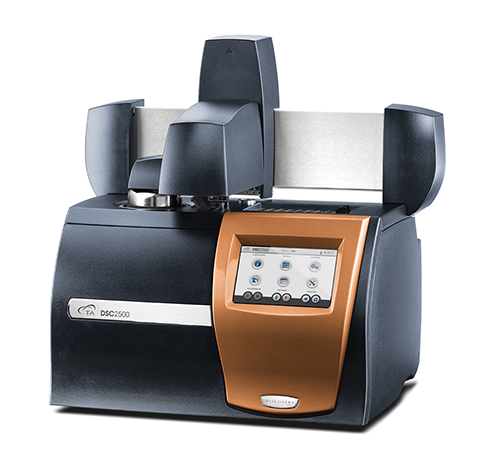Instruments
Overview
Differential Scanning Calorimetry (DSC) is a thermoanalytical method that measures the difference in heat required to raise the temperature of a sample compared to a reference, across a range of temperatures. Both the sample and reference are kept at nearly the same temperature during the test. Typically, the temperature of the sample holder in a DSC analysis is programmed to increase linearly over time. The reference sample used should possess a well-defined heat capacity throughout the scanned temperature range. Differential scanning calorimetry is versatile in its applications, enabling the observation of melting and crystallization events, as well as glass transition temperatures (Tg). Additionally, DSC is effective for studying oxidation and other chemical reactions.

Key Features
- New Fusion Cell™ with patented technology for unrivaled performance in baseline flatness, sensitivity, resolution, reproducibility, and reliability.
- Exclusive T4P Tzero® heat flow technology for ultimate DSC performance and unique capability to conduct and store heat capacity measurements in a single run.
- New innovative “app-style” touch screen puts instrument functionality simply One-Touch-Away™, enhancing usability and making it easier than ever to get great data.
- Reliable linear autosampler with programmable tray positions for worry-free 24/7 operation, most flexible programming of experiments, and automated calibration and verification routines.
- Modulated DSC®, (MDSC®), for the most efficient separation of complex thermal events.
- Widest range of refrigerated cooling options eliminates liquid nitrogen expense and ensures uninterrupted subambient operation during extended autosampler routines.
- Tzero Press and Pans for fast, simple, and reproducible sample preparation.
- Commitment to quality backed by the industries ONLY five-year cell and furnace warranty for peace of mind.
Specifications
| Baseline Flatness (-50 to 300°C) | ≤5 μW | ||
| Baseline Repeatability (-50 to 300°C) | <10μW | ||
| Temperature Range | -180°C to 725°C | ||
| Temp Accuracy | ±0.025°C | ||
| Temp Precision | ±0.005°C | ||
| Enthalpy Precision | ±0.04% |



